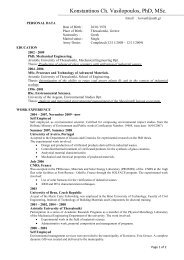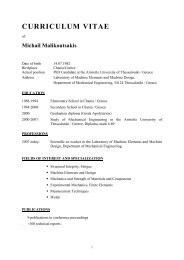international cooperation in education - Laboratory of Heat Transfer ...
international cooperation in education - Laboratory of Heat Transfer ...
international cooperation in education - Laboratory of Heat Transfer ...
You also want an ePaper? Increase the reach of your titles
YUMPU automatically turns print PDFs into web optimized ePapers that Google loves.
Internationalisation <strong>of</strong> the Debate on Architectural Education<br />
by Constant<strong>in</strong>-Victor<br />
Spyridonidis,<br />
assistant pr<strong>of</strong>essor,<br />
AUTh.<br />
ENHSA - Lat<strong>in</strong> America<br />
The ENHSA Lat<strong>in</strong> America Programme is an extension <strong>of</strong> the activities <strong>of</strong> Thematic<br />
Network ENHSA <strong>in</strong> Lat<strong>in</strong> American Countries and the USA. It is an Erasmus-Mundus<br />
Action 4 Internationalisation <strong>of</strong> the Thematic Networks programme,<br />
whose participants <strong>in</strong>clude -<strong>in</strong> addition to the Institutions that are Members<br />
<strong>of</strong> the ENHSA TN- the ACSA (Association <strong>of</strong> Collegiate Schools <strong>of</strong> Architecture)<br />
and 19 Schools <strong>of</strong> Architecture from 13 countries <strong>of</strong> Lat<strong>in</strong> America.<br />
In the strong <strong><strong>in</strong>ternational</strong>isation dynamics <strong>of</strong> our era, architecture, as the spatial<br />
manifestation <strong>of</strong> our lives, is experienc<strong>in</strong>g a radical worldwide transformation and<br />
redef<strong>in</strong>ition <strong>of</strong> its referential values, pr<strong>in</strong>ciples, and conceptions. The pr<strong>of</strong>ile <strong>of</strong> the<br />
contemporary architect is no longer commonly agreed upon, and its re-def<strong>in</strong>ition<br />
constitutes a central issue <strong>of</strong> all local and <strong><strong>in</strong>ternational</strong> pr<strong>of</strong>essional associations,<br />
<strong>education</strong> <strong>in</strong>stitutions, and governmental bodies. Architectural <strong>education</strong> <strong>in</strong> this rapidly<br />
chang<strong>in</strong>g and <strong>in</strong>creas<strong>in</strong>gly mobile world becomes a critical <strong><strong>in</strong>ternational</strong> issue<br />
demand<strong>in</strong>g new strategies to direct curricula reforms.<br />
As the isolation <strong>of</strong> our days appears to be a non-promis<strong>in</strong>g strategy, Schools <strong>of</strong> architecture<br />
need to approach the issue <strong>of</strong> contemporary architectural <strong>education</strong> collectively.<br />
In order to do that, they must develop a creative environment <strong>of</strong> effective academic dialogue,<br />
which will permit us to better understand others and, consequently, to better understand<br />
ourselves. The overall pr<strong>in</strong>ciple that must direct our <strong>in</strong>itiatives is that the <strong><strong>in</strong>ternational</strong><br />
dimension must not threaten or <strong>in</strong>timidate the <strong>in</strong>valuable cultural, regional, national,<br />
and pedagogical identity <strong>of</strong> Schools <strong>of</strong> Architecture <strong>in</strong> different regions. In order<br />
to achieve this rather difficult objective, which is to be <strong><strong>in</strong>ternational</strong> without los<strong>in</strong>g our<br />
local identities, we have to develop new strategies to structure our curricula and teach<br />
our students, while at the same time implement<strong>in</strong>g new pedagogical tools.<br />
This is why <strong>in</strong> this programme we focus on the <strong>in</strong>terest <strong>of</strong> our activities <strong>in</strong> the <strong>in</strong>vestigation<br />
<strong>of</strong> the contemporary pr<strong>of</strong>ile <strong>of</strong> an architect, <strong>in</strong> order to work collectively<br />
on the strategies, paths, <strong>education</strong>al structures, and pedagogic processes which will<br />
be able to generate this pr<strong>of</strong>ile. As a basic tool <strong>in</strong> this approach we use the notion <strong>of</strong><br />
competences. We understand the notion <strong>of</strong> competences as a basic component <strong>of</strong><br />
the deep structure <strong>of</strong> the pr<strong>of</strong>ile <strong>of</strong> the graduate architect, the condensed <strong>in</strong>formation<br />
on the basis <strong>of</strong> which it is generated, someth<strong>in</strong>g like its DNA: not completely pre-def<strong>in</strong><strong>in</strong>g<br />
it, but adequately prescrib<strong>in</strong>g it to assure quality, flexibility, transparency, and<br />
clarity. On this understand<strong>in</strong>g, the structure <strong>of</strong> the curriculum is a project aim<strong>in</strong>g at<br />
the generation <strong>of</strong> this DNA on the basis <strong>of</strong> competences, capable to reflect the local<br />
socio-cultural particularities, the specific conditions <strong>of</strong> the pr<strong>of</strong>essional practice, the<br />
precise policy-strategy <strong>of</strong> the school as a reflection <strong>of</strong> its own visions for the future.<br />
In the same contexts, teach<strong>in</strong>g is no longer conceived as a process concentrated on<br />
what students have to know <strong>in</strong> order to become architects, but ma<strong>in</strong>ly on what they<br />
will be able to do by know<strong>in</strong>g what they have been taught.<br />
The programme is developed on the basis <strong>of</strong> a number <strong>of</strong> planned academic<br />
events, which will promote a systematic academic dialogue between the partners<br />
on issues related to the necessary reforms the traditional architectural <strong>education</strong><br />
system has to realise <strong>in</strong> order to be adapted <strong>in</strong> our fast chang<strong>in</strong>g world. More specifically,<br />
the ma<strong>in</strong> theme <strong>of</strong> the programme will be the construction <strong>of</strong> new architectural<br />
curricula and the development <strong>of</strong> new teach<strong>in</strong>g practices compatible with the<br />
contemporary pr<strong>of</strong>ile <strong>of</strong> the architect, the conditions <strong>of</strong> the labour market, and the<br />
new trends <strong>in</strong> <strong>education</strong> sciences. More <strong>in</strong>formation on this project is available at the<br />
ENHSA Thematic Network site: www.enhsa.net.<br />
[¤]<br />
32 │ARISTOTLE UNIVERSITY THESSALONIKI│SCHOOL OF ENGINEERING





